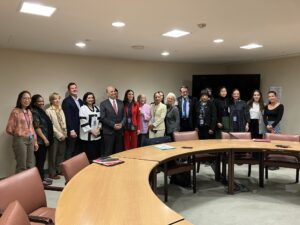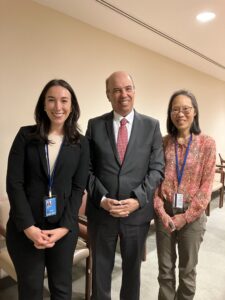“Advancing Global Human Rights Together: Key Takeaways”
Meeting with the Human Rights Council President
 On April 25, 2024, HRN representatives in New York attended the meeting with H.E. Ambassador Omar Zniber, the President of the Human Rights Council, held at the United Nations Headquarters. The meeting focused on a variety of critical topics discussed during the 55th session of the Human Rights Council (February 26 – April 5, 2024)1 and the future directions under his presidency.
On April 25, 2024, HRN representatives in New York attended the meeting with H.E. Ambassador Omar Zniber, the President of the Human Rights Council, held at the United Nations Headquarters. The meeting focused on a variety of critical topics discussed during the 55th session of the Human Rights Council (February 26 – April 5, 2024)1 and the future directions under his presidency.
Key points from the discussion include:
Outcomes of the 55th HRC Session
The session was noted for its length and breadth, tackling issues and country-specific issues ranging from violence, security, the environment, cultural rights, freedom of religion or belief, food security, and their impacts on human rights. A significant focus was on how these issues could contribute to the upcoming Summit of the Future, including the opportunities and challenges posed by new technologies.
Organizational Matters
The President discussed about elevating the status of the HRC to enhance contributions from Geneva in New York, focusing on gender equality, gender parity, and reforming the Universal Periodic Review (UPR) process to make it more effective.
NGO Contributions and Concerns
Various NGOs expressed concerns about direct and indirect threats of climate change and human rights pushback in the Gaza situation. NGOs urged the HRC to scale up non-violence and peace initiatives. Concerns have also been raised about the upcoming national elections in 54 countries this year. NGOs emphasized significant impacts on human rights advocacy, particularly regarding the detention and safety of advocates and reporters.
NGO Proposals and Requests
NGOs proposed scaling up the work of the HRC on sexual harassment and human trafficking, emphasizing the need to criminalize trafficking effectively while doubtful of the proposed guidance to decriminalize adult voluntary sex work2 that this may be inconsistent with international norms, perpetuate trafficking and exploitation, particularly of marginalized women and girls, create barriers to equality, and contribute to the erosion of the rule of law.
Hybrid Modalities and Future Engagements
The President discussed a possibility of hybrid modalities to better integrate inputs from NGOs and government missions not based in Geneva, taking into consideration the liquidity crisis and the need for efficient process management. He looks forward to continued collaboration with NGOs and the intention to work closely with other UN agencies (UNHQ, CEDAW, UN Women) and regional bodies like the EU (in relation to its new law on combatting forced labor, especially among children).
The session was informal and the discussion interactive. NGOs expressed their sincere gratitude to the President and deeply appreciated the opportunity to be involved in shaping the agenda and enhancing the effectiveness of the Human Rights Council in addressing global human rights challenges.
References:
● https://www.ohchr.org/en/hr-bodies/hrc/regular-sessions/session55/list-reports




